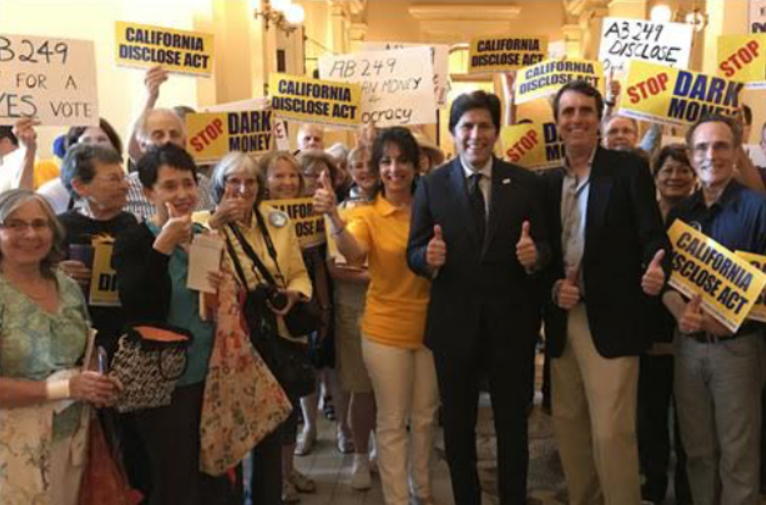Over the past year, I have interviewed democracy reformers across the country. I have heard many stories of victories that have pushed state democracies forward, most of which were recorded in my book Daring Democracy, coauthored with Frances Moore Lappé. Since handing in the manuscript, though, there have been many more successes and emerging grassroots efforts. This interview is part of an effort to chronicle these developments in the growing Democracy Movement.
Recently, I spoke with Trent Lange, the president and executive director of the California Clean Money Campaign, the sponsor of the 2017 California DISCLOSE Act. He has worked with CCMC since 2003 and has participated in numerous state ballot measure campaigns including the 2011 Measure H campaign that strengthened the system of public campaign financing for Los Angeles.
Adam Eichen: It’s been about two months since the DISCLOSE Act passed in California. First of all, congratulations. What an achievement! Can you explain why better disclosure on political ads so important?
Trent Lange: Thanks! For a while now—especially since Citizens United—SuperPac and ballot measure ads have been purchased by wealthy special interests that hide who’s really paying for the ads. So we see deceptive but convincing ads that mislead viewers about who’s behind them.
California has long had some of the strongest disclosure laws in the country. For instance, we have online reporting of political spending and require many ads to display their top two funders. But that’s not good enough. Ads bury disclosures in fine print. Worse, special interest funders often funnel their money through nice-sounding front groups like “Californians for Happy Children” that are disclosed instead of them.
Adam Eichen: So what does the California DISCLOSE Act do to fix these problems?
Lange: The California DISCLOSE Act requires ballot measure and independent expenditure advertisements to clearly and prominently show the top three funders of $50,000 or more. On TV ads, for example, the disclosures must appear on the bottom third of the screen against a solid black background, with the name of each funder displayed on a separate line in a big font. Tricks to obscure donor names are no longer allowed. There are similar clear rules for radio and print ads.
Even more importantly, on ballot measure ads, funders cannot hide their names behind front groups anymore. If you gave your money for a specific ballot campaign and your contributions make you one of the top three donors to the committee paying for the ad, the ad must show your name instead of a front group’s, no matter how many committees your money passed through.
These provisions are the first of their kind anywhere to reveal secret money where it matters most, on the ads themselves.
Eichen: If I understand correctly, you’ve been working on passing the DISCLOSE Act since 2011—so a full six years. That’s quite a long time. What was the strategy?
Lange: Well, we always knew passing a law that affected ads costing hundreds of millions each election cycle wouldn’t be easy. Indeed, we faced tremendous opposition from multiple powerful interests in Sacramento whose advertising would be affected.
So we built the strongest grassroots campaign possible and combined it with a broad coalition. We worked closely with reform partners across the state like Common Cause, CALPIRG, MapLight, and Money Out Voters In, progressive activist organizations like Courage Campaign, CREDO, Daily Kos, LegitAction, and People Demanding Action, plus diverse issue organizations representing the environment, seniors, women, consumers, health care, people of faith, working families, and more.
Fortunately, we also had the leadership of legislative champions like AB 249 author Assembly Speaker pro Tem Kevin Mullin and coauthors like Senators Ben Allen, Jerry Hill, and Henry Stern. In the end, as our grassroots and coalition campaign reached a crescendo and when it was do or die, legislative leadership in both houses—Senate President pro Tem Kevin de León and Assembly Speaker Rendon—heard the voice of the people and stepped up to help get it through on unanimous votes from Democrats plus the votes of a few leading and principled Republicans, including Assemblymembers Catharine Baker, Tom Lackey, and Marc Steinorth and Senators Anthony Cannella and Scott Wilk.
The key was that we kept coming back, gaining ground and growing louder every year until it passed.
Eichen: If I remember correctly, you almost passed the law sooner. In 2016, the DISCLOSE Act failed by one vote, is that right?
Lange: Yes. In California, changes to campaign finance laws require approval of two-thirds of the legislature—a high hurdle. In 2016, we were very close as the bill came within one vote of the threshold in a vote held five minutes before midnight on the final day of legislative session! We needed a single Republican vote in the Senate because at the time the Democrats lacked a two-thirds majority. We tried hard to get one of the Republicans to vote “yes” as some as their Assembly colleagues had, but we unfortunately couldn’t.
After getting so close we redoubled our efforts. And this year we not only cleared the two-thirds hurdle and got it signed by Governor Brown, but also did it with bipartisan support in both houses.
Eichen: As an intransigent Republican majority refuses to even consider new federal campaign finance laws, do you see state-based reform as the pathway forward?
Lange: Definitely. We were initially inspired by the 2010 federal DISCLOSE Act bill that came within one vote of passing but couldn’t break the GOP’s filibuster. We thought California had a good chance of passing such a law and setting an example for the country. Knowing we could inspire activists in other states motivated everyone. By succeeding in our own state—showing that it’s possible for grassroots to pressure legislators from both parties to vote the right way and inspiring others to do the same—we create pressure on Congress and other states to act.
Eichen: While interviewing democracy advocates across the country for Daring Democracy, I often heard exactly that: state-based reform is never just about one state. It’s about showing what’s possible for democracy reformers. Take Oregon passing automatic voter registration in 2015. They showed how well it works, other states took notice, and now nine other states and D.C. have adopted the reform.
Lange: Exactly. A single state can make a big difference by breaking through and serving as an example.
Eichen: So what advice do you have for those who want to pass democracy reform in their home state?
Lange: Great question. Big changes take a lot of effort and persistence. Ours took nearly seven years and thousands of activists. So one thing I would say is: Don’t get discouraged. Continue building. Every year we got our bill further in the legislative process. The grassroots campaign got bigger. The coalition got stronger. Also, we used the grassroots effort to garner press and show any legislator who voted against the DISCLOSE Act they would be held accountable, or if they stepped up we’d publicly give them credit. We worked with legislative champions like Assembly member Mullin and used grassroots activities to continually grow support for the bill.
Eichen: So a key takeaway is that anybody can be a part of these campaigns. Expert knowledge isn’t a prerequisite for involvement?
Lange: Right. You need to have an organization or two to lead the effort so people know how to plug in. When you have that, there are so many different ways for people of all backgrounds to get involved. There were more than one hundred thousand people involved in the California DISCLOSE Act effort. Most signed petitions—which is easy but crucial. Tens of thousands made phone calls or sent emails to legislators. A phone call takes a minute yet makes a big impression. Thousands were even more involved on social media, by gathering signatures at local farmers markets, phone banking, or participating in rallies, town halls, and lobby days. There are so many ways to get involved and they all make a difference.
Most importantly, persist! A big reason we won is that the legislature knew we were never going away and that we’d keep getting louder all the time.
Eichen So what’s next for the California Clean Money Campaign?
Lange: We’re watching closely to make sure the California DISCLOSE Act is implemented correctly and works. If there are any problems, we’ll be here to fix them and improve it.
As for next laws, we’re looking at public financing of campaigns, something greatly needed everywhere so that politicians aren’t reliant on big money donors and spending all their time fundraising. For legal reasons, we might have to pursue it via ballot initiative in California, but it’s a must one way or another.
And we’re already working to pass the Petition Disclosure Act which would require paid signature gatherers to inform voters of the top funders of the initiatives they’re asked sign. We’re hoping to pass it next year, so encourage people to go to our website, www.YesFairElections.org, to sign the petition and get involved!
Eichen: Sounds like you’ll have your hands full! Thank you so much for your time. This was a fantastic conversation and I hope you take the opportunity to celebrate this hard fought victory.





